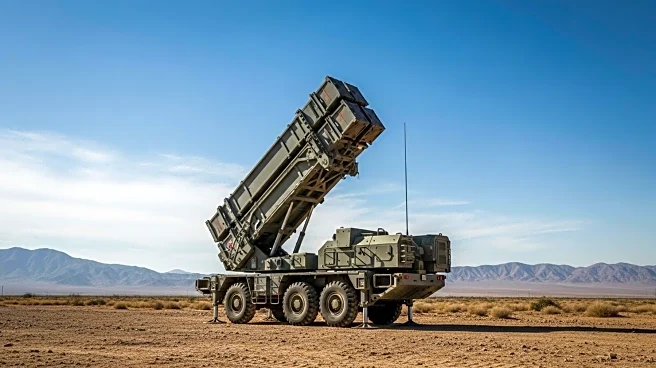What is the story about?
What's Happening?
The Pakistan Army has successfully conducted a training launch of its newly developed Fatah-IV land-attack surface-to-surface cruise missile. This event marks the first official confirmation of the missile's existence, as announced by the Inter-Services Public Relations (ISPR) on September 30. The Fatah-IV missile, which is part of the newly established Army Rocket Force Command (ARFC), is equipped with advanced avionics and navigational aids. It is designed to evade enemy missile defense systems due to its terrain-hugging capabilities and can engage targets with high precision. The missile has a range of 750 km, a maximum altitude of 50 meters, a length of 7.5 meters, and a weight of 1,530 kg. Unofficial images of the missile first appeared on social media in August 2025 during an event celebrating Pakistan's 78th Independence Day.
Why It's Important?
The successful test launch of the Fatah-IV missile represents a significant enhancement of Pakistan's military capabilities, particularly in terms of its conventional missile systems. By integrating advanced technology and precision targeting, the Fatah-IV strengthens Pakistan's defense posture and strategic deterrence. This development could influence regional security dynamics, especially in South Asia, where missile capabilities are a critical component of national defense strategies. The establishment of the Army Rocket Force Command further underscores Pakistan's commitment to modernizing its military infrastructure and maintaining a robust defense system. This advancement may prompt neighboring countries to reassess their own military strategies and capabilities, potentially impacting regional arms dynamics.
What's Next?
Following the successful test launch, the Pakistan Army is likely to continue integrating the Fatah-IV missile into its operational framework. This may involve further testing and refinement to ensure optimal performance and reliability. The introduction of the Fatah-IV could lead to increased military exercises and strategic planning within the Army Rocket Force Command. Additionally, regional stakeholders, including neighboring countries and international defense analysts, will closely monitor Pakistan's missile developments. This could lead to diplomatic discussions or adjustments in regional defense policies as countries seek to balance military capabilities and maintain strategic stability.
Beyond the Headlines
The development and deployment of the Fatah-IV missile raise important considerations regarding regional security and arms control. As countries in South Asia continue to enhance their military capabilities, there is a growing need for dialogue and confidence-building measures to prevent escalation and maintain peace. The introduction of advanced missile systems like the Fatah-IV also highlights the importance of international arms control agreements and non-proliferation efforts. Ensuring transparency and communication among regional powers could help mitigate the risks associated with an arms race and promote stability in the region.
















